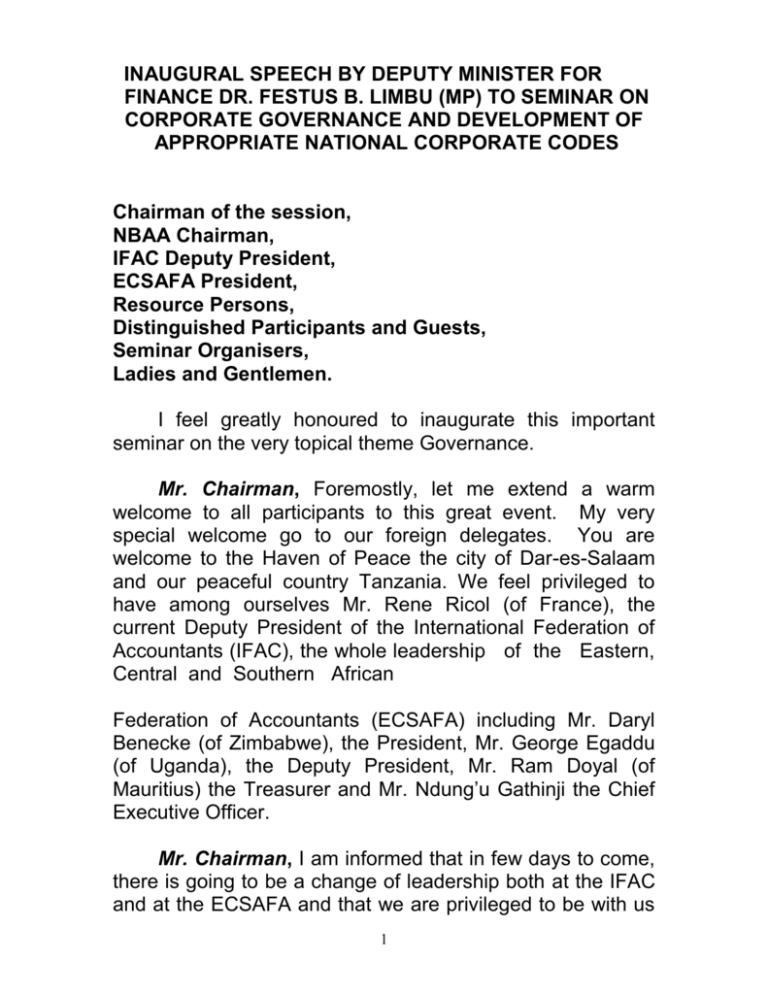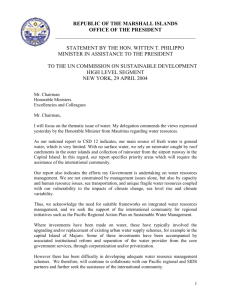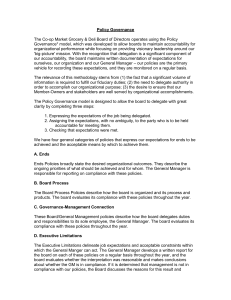inaug - Ministry of Finance
advertisement

INAUGURAL SPEECH BY DEPUTY MINISTER FOR FINANCE DR. FESTUS B. LIMBU (MP) TO SEMINAR ON CORPORATE GOVERNANCE AND DEVELOPMENT OF APPROPRIATE NATIONAL CORPORATE CODES Chairman of the session, NBAA Chairman, IFAC Deputy President, ECSAFA President, Resource Persons, Distinguished Participants and Guests, Seminar Organisers, Ladies and Gentlemen. I feel greatly honoured to inaugurate this important seminar on the very topical theme Governance. Mr. Chairman, Foremostly, let me extend a warm welcome to all participants to this great event. My very special welcome go to our foreign delegates. You are welcome to the Haven of Peace the city of Dar-es-Salaam and our peaceful country Tanzania. We feel privileged to have among ourselves Mr. Rene Ricol (of France), the current Deputy President of the International Federation of Accountants (IFAC), the whole leadership of the Eastern, Central and Southern African Federation of Accountants (ECSAFA) including Mr. Daryl Benecke (of Zimbabwe), the President, Mr. George Egaddu (of Uganda), the Deputy President, Mr. Ram Doyal (of Mauritius) the Treasurer and Mr. Ndung’u Gathinji the Chief Executive Officer. Mr. Chairman, I am informed that in few days to come, there is going to be a change of leadership both at the IFAC and at the ECSAFA and that we are privileged to be with us 1 today the future presidents of these institutions. Mr. George Egaddu will take over the ECSAFA presidency from Mr. Benecke during the ECSAFA council meeting to take place on the 2nd November,2002 at the Paradise Hotel in Bagamoyo, another historical town in Tanzania. Mr. Ricol, I am told, will be ascending to the IFAC’s presidency during the forthcoming IFAC council meeting to be held on the 17th and 18th November 2002 in Hong Kong. It is my pleasure on your behalf to congratulate them for their anticipated high office positions and wish them a very successful tenureship. Mr. Chairman, The objective of this seminar is to equip the seminar participants with tools of enhancing financial management and accountability in the public sector as part and parcel of strengthening good governance. As you know, good corporate governance, or good governance, is essential for all successful organizations whether public or private. Corporate governance centres on how organizations are directed, controlled and held to account. It is therefore important that corporate governance be underpinned by principles of openness, integrity and accountability. These fundamentals are key for building effective organizations that get the trust of the public at large. For more than a decade now good governance practices has been recognized as necessary for the good and effictive running of organisations by many developing nations as well as our development partners inclusive of the World Bank, International Monetary Fund (IMF), United Nations etc. Although governance issues are crosscutting, yet they may vary across-countries. Experience has shown that there are certain key areas that need to be addressed in order to foster good governance in the public as well as private sectors. Need less to say, the basic and major underlying element that unites all these areas is the issue of transparency. 2 Effective delivery of services to the public demands the existence of a conducive and facilitative environment. These encompasses policy making, regulation, administration, enforcement, planning and service delivery. For governments to attain economic efficiency and sustainable growth, the environment need to be responsive to the needs of the public and be transparent in its delivery. One way of ensuring this transparency is to advocate and ensure compliance to good governance principles especially within the financial management area. Transparency in the conduct of business inevitably leads to the reduction of corrupt practices, which accounts for efficient and effective service delivery. Mr. Chairman, Openness, objectivity, integrity, honesty and accountability are necessary ingredients of effective governance. The public servants deserve to demand it. The higher authorities including accounting officers and other senior public officers/managers are expected to conduct themselves in accordance with highest standards of behaviour as role models to others. It goes without saying that all staff are entitled to be treated by their managers and colleagues fairly, transparently, honestly, courteously and considerately. Mr. Chairman, For any institution, be it a public or private, to be able to practice good governance, it need to have in place: appropriate legal framework proper organizational structures and processes proper governance framework Standards of behaviour 3 These four pillars are crucial for any meaningful implementation of good governance in any country. Yet, having the four pillars alone is not enough. They should be applied and generally be integrated in the normal procedures and practices of an entity. And of course, it have to be incorporated within the management culture and be part of the decision making process. Mr. Chairman, most developing countries, Tanzania alike, have some outdated legislation in force. Obviously this might not be conducive for the adoption of good governance principles. Standards of behaviour of the majority leaves much to be desired. Apart from all these constraints, the government on its part have demonstrated a clear commitment to improve financial management of our scarce resources. Of recent past, the Government in its efforts to foster greater and effective financial management enacted the Public Finance and Public Procurement Acts, together with their related regulations. The main challenge for the Government now is to ensure the enforcement of the new laws and to build capacity on sustainable basis at all levels. Efforts in promoting greater transparency and accountability, propelled the third phase government to find it fit to establish a full-fledged Ministry under the auspices of the Presidents office to deal specifically with governance issues. This clearly demonstrates the political commitment of the current government in promoting good governance in its day to day operations such that good governance becomes part of the culture and practice in the country particularly in the public sector. 4 Mr. Chairman, Public sector organizations need effective structures to ensure proper accountability, clear communication with stakeholders and clarity about roles and responsibilities. Proper accountability entails being accountable to the public for public money and resources including reporting on the performance of the organization in relation to clear defined objectives. It is important also communication with stakeholders (e.g. the public, staff, parliament, suppliers, recipients of services supplied) to be open, honest, transparent, timely and relevant to the stakeholders’ interests. Mr. Chairman, improvements in the management and administration of government are essential if the global efforts to halt corruption and other types of irregularities are to achieve desired results. This means that the rules and systems of financial accountability, record keeping, accounting and reporting, internal control and internal auditing have to be well defined. Without an integrated accountability framework or defined measurable performance indicators to determine objectively whether financial records are maintained and managed effectively, financial and other records may be unreliable, incomplete and difficult to use. All these serves to create opportunities for fraud, graft, inefficiency and waste which also leads to loss of revenue and impedes economic and fiscal planning. Mr. Chairman, the reputation of an organization also depends on the standards of behaviour of everyone within that organization, whether they are senior managers, staff or agents contracted by it. Effective procedures and safeguards should therefore be put in place to ensure that all management and staff are committed to the highest standards of behaviour. These rules of the game should 5 enable all public servants to conduct themselves in accordance with high standards of behaviour and ethics to maintain the organisation’s good reputation. Mr. Chairman, Poverty is among the main obstacles to the fight against corruption. As such corruption further intensifies poverty. The poverty under reference is attributed by: Lack of income and assets (human, natural, physical) Powerlessness of the poor people Vulnerability to adverse shocks – inability to cope with shocks The status of poverty in Tanzania has been reported in the results of various surveys, mainly the Household Budget Survey (HBS), the Integrated Labour Force Survey (ILFS) etc. According to the HBS 1991/1992, about 48.4% of the total population are considered to be poor, with their consumption expenditure being below basic needs poverty line. Mr. Chairman, a growing economy offers opportunities for the poor to earn a decent income if and only if growth is also widely spread and occurs in those sectors upon which the poor depends the most. In case of Tanzania, this should be the agricultural sector. Our country’s efforts to restore economic growth and productivity, have resulted into positive macro economic indicators even though overall the economic outlook would appear bleak. 6 If the targets contained in the Poverty Reduction Strategy for reducing poverty and improving service delivery are to be achieved, efforts to strengthen systems of governance must remain at the centre of the GOT reform agenda. In this regard no stone should be left unturn in fighting corruption, abuse of power and the use of public office for private gain, and other types of irregularities in public administration and governance. Mr. Chairman, it is clear that the government has a role to play in providing overall expertise on good governance practices that reduce or control corruption levels effectively, based on knowledge of international best practices and experience. Need less to say, the government need to develop and enhance the mechanism to monitor the practice of accounting and auditing in the public sector. This will include training as well as other capacity building activities to strengthen major public watchdogs: the Parliamentary Accounts Committee (PAC), Public Investment Committee (PIC) and the Local Authorities Accounts Committee (LAAC), transparency and the rule of law. Mr. Chairman, Despite of endless indulgence in putting in place an effective good governance in many developing countries inclusive of Tanzania there remains big challenges ahead:- There is a shortage of skills and lack of familiarity with board of directors’ functions and fiduciary responsibilities 7 Lack of transparency allocation. Intra-group resources The lack of enforcement of existing measures has contributed to poor governance regulatory corporate Regulatory policy has been created for competition but implementation and enforcement have been hampered by the limited understanding of the rules of competition and regulatory reform and by weak institutional capabilities. in Mr. Chairman, The Government recognises that for long term plans to be successful and lead to growth and stability, while ensuring good governance, there is need to ensure that there is an effective accountability mechanism in place. These cannot be enforced without transparency and the rule of law. In this recognition the government has implemented the Accountability, Transparency and Integrity Project (ATIP) to support the implementation of its strategic framework for good governance by: Strengthening the legal and judicial systems Enhancing public financial accountability Strengthening oversight and watchdog institutions (OWIS) and Program management and coordination of government’s programs aimed at enhancing transparency and integrity. Mr. Chairman, NBAA, by having the statutory mandate to develop and regulate the accounting profession in the 8 country, has a financial accountability role within ATIP. This will lead to a necessity to strengthen the capacity of NBAA as well as relevant parliamentary committees to enhance their ability of regulating and overseeing the accounting and auditing functions in the country. Mr. Chairman, in Tanzania there is a shortage of qualified accountants. Demand for qualified accountants exceeds the current supply by a significant margin in both the public and private sectors. Unfortunately, very few private institutions if any do train their own professional such as Accountants in Tanzania. This seem to be a business almost solely left to Government and its institutions. However, this is not an excuse. The GOT is working very hard to ensure that all the accountants in the public sector are qualified as required by law so as to enhance good governance. We are all aware that, as accountants, professionals in the member bodies of the Eastern, Central and Southern Africa Federation of Accountants (ECSAFA) are particularly concerned about the way that organizations manage their affairs whether they work in the private or public sectors. They expect their organizations to uphold the highest standards of accountability, openness and integrity. Mr. Chairman, May I conclude once again by thanking the organizers of this seminar. Let me emphasize that, the future of our countries demands accountants and all other professionals to ensure good governance through enhancing financial management and accountability and ultimately reduce corruption and thus implicitly address poverty. We have to put in place codes of conduct, which will reflect the three fundamental principles of openness, integrity and accountability. These should also address: 9 Honesty Objectivity and Openness and relationships. Public servants as well as private sector operators should not offer or accept any payment, bribe, favour or inducement. As I said earlier, it is in this area that accountants and financial analyst should play a leading role in ensuring that they set up a modus operandi to discourage such practices. This will ensure that the financial management and accountability systems are sound, beneficial and sustainable to our society. We bank on you to play your part with diligence, integrity and honesty. Thank you! 10







